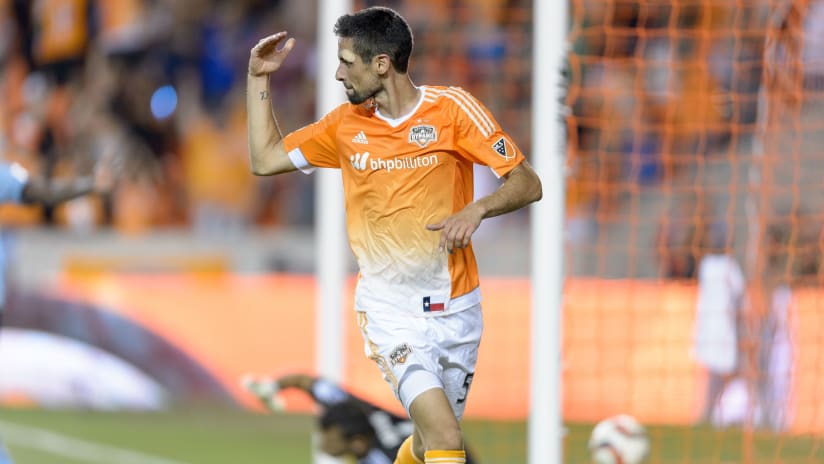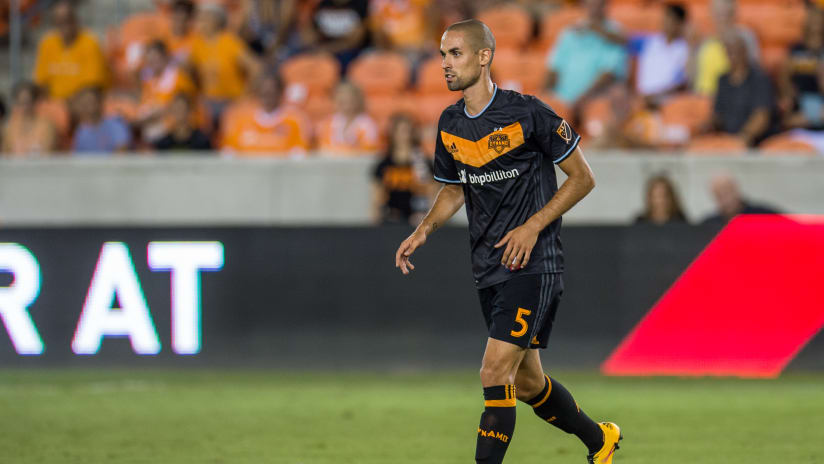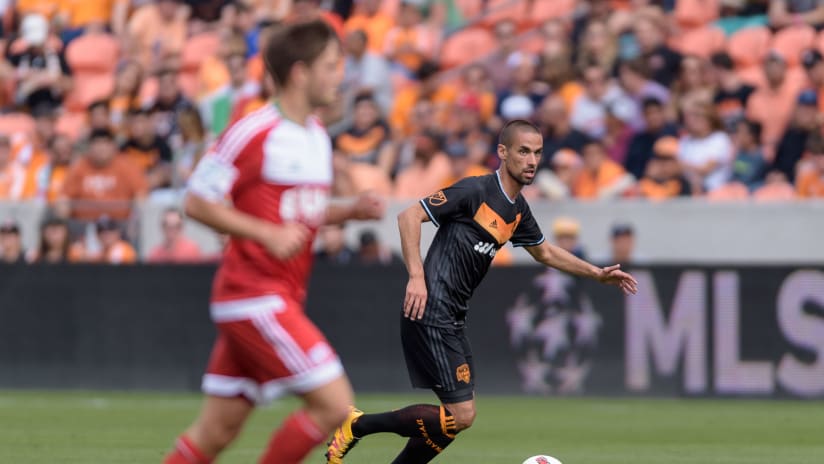Houston Dynamo defender Raúl Rodríguez knew Dutch legend Johan Cruyff in a way few other current players can—he was selected by the soccer legend for the Catalonia national team twice, beginning in 2011. Cruyff, a three-time World Player of the Year, passed away at age 69 on March 24 after a battle with lung cancer.
Many believe that no person has had more impact on the game of soccer than Cruyff, who followed a legendary playing career with a managerial tenure that was in some ways even more impactful. In addition to celebrated managerial stints with his boyhood club Ajax Amsterdam and his adopted home of FC Barcelona, Cruyff managed the Catalonia national team from 2009-13 and selected the Dynamo defender for two games, his first call in 2011 and again two years later.
Rodriguez made his lone appearance for Catalonia in December 2011, a goalless draw against Tunisia at Estadi Olímpic Lluís Companys, then Rodriguez’s home stadium with RCD Espanyol.
“It was only two days, in two different times with the Catalonia national team,” Rodríguez told HoustonDynamo.com. “The important thing for me is that he selected me, more than he trained me, because we never had time to train. He talked to us for 30 minutes and that was the fun part.”
Five years later, Rodríguez is one of three Spaniards on the Dynamo—along with David Rocha and Agus Garcia—and still values many of the soccer principals Cruyff brought to Barcelona as a manager beginning in 1988 with the Dream Team. The foundation laid by Cruyff took more than ten years to come to full bloom, but led to a historic run for Barca, who won four UEFA Champions League titles from 2006-15, and also with the Spanish national team, which captured the 2008 and 2012 European Championships and La Roja’s first World Cup triumph in 2010.
“I didn’t have the opportunity to directly learn from him, but indirectly he had a big influence on me as a player,” said Rodríguez. “Then for my generation—I’m from ’87, and I’m the same generation as Messi, Pique, Fabregas, all these guys—we were very influenced by him in an indirect way. The way Barcelona started to play, and the philosophy they built in that team, it was so successful it changed the way we saw the game and adapt within it. It made the coaches look at different players than the usual players. No matter if you’re tall or small, or strong (or lean), it is about your brain being fast (on the field), and that’s something everyone can learn. And Cruyff was probably the first person to start that (thinking).”
Cruyff summoned Rodríguez again in 2013 for Catelonia’s friendly against Nigeria. The center back was scheduled to enter the match at halftime, but was ill and couldn’t play. Rodríguez still remembers Cruyff’s manner and tactics in the pregame speech to the squad.
“I grew up watching a television show called Forca Barca, and Cruyff was on the show, and he had a very particular way of speaking Spanish,” said Rodriguez. “So the first time I hear him speak (to the team), it seemed like he was trying to impersonate himself (laughs). We were looking around the room saying, ‘Wow, this man really sounds like Johan Cruyff.’
“He used to say, ‘If you play in one touch you are very good, if you play two touches, you are good, if you play three touches, you are the worst player in the world.’ He had an obsession with move and pass.”
Cruyff arrived at Barcelona as a player in 1973 and felt the city had an inferiority complex toward Madrid, the Spanish capital with the grander soccer history at the time. Immediately, Cruyff felt a desire to change the Catalan “inferiority complex” toward Madrid. In 1974, Cruyff’s wife Danny was scheduled to give birth on Feb. 17, the same day as the all-important Barcelona-Real Madrid match. Johan and Danny agreed to move the birth up a week, allowing Cruyff to play in his first El Clasico in Madrid, and Barcelona famously won 5-0 at the Bernabéu, a landmark win in the rivalry. It also helped that the Cruyff’s had named their newborn son Jordi, a distinctly Catalan name.
“If that’s true [a Catalan inferiority complex toward Madrid], I can’t imagine Barcelona with an ‘inferiority complex,’ Rodríguez said. “I’m sure it happened, because you only have to see the numbers for Real Madrid, and how many trophies they won. Barcelona was always a big team, but before Cruyff, they were the second team. I’m sure he changed the mentality through soccer.”
Rodríguez was born in Barcelona in 1987 and rose through the ranks of the soccer capital’s small clubs, including Vilassar Mar and UDA Gramenet, where he made his Segunda B debut. He moved to Espanyol in 2010 and made his La Liga debut that November. His entire soccer education was influenced by the early stages of Cruyff’s imprint on Spain, as Cruyff coached Barcelona from 1988-96, winning 11 trophies, and later returned as an advisor and was appointed honorary president in 2010.
“There are a lot of people trying to implement different things in soccer, but very few of them are successful,” Rodríguez said. “Johan Cruyff was successful, and the way he saw the game was very different at that time, but his influence was so big. Now, the way I play, and the way I speak to my teammates, and I don’t know if I’ll ever be a coach, but if I am in the future, obviously the way I see soccer has been influenced by these guys, starting with Johan Cruyff.”
Cruyff is credited with developing the idea for FC Barcelona’s now famous La Masia youth academy. He proposed the academy setup in 1979, modeled after the Ajax academy Cruyff rose through as a youth in Amsterdam.
“It was not just about the first team, he implemented the way they saw the soccer across the club,” said Rodriguez. “From boys at age 10, up through 11, 12, 14, and 15 who actually became players when (Pep) Guardiola became coach. Xavi started playing at Barcelona when he was 11 years old, Iniesta, Messi, Pique and Busquets were all young when they arrived. All these guys, I can tell you, played as kids at Barcelona the way Johan Cruyff saw the game. He implemented his philosophy at a club level, something no one was doing at that time, and by the time they arrived at the first team, they were playing the same way for about 10 years. So it was easy for them, to go from the B team to the first team, because they were doing the same thing, over and over and over.”
Cruyff saw the game differently than most. Cruyff won the Player of the Tournament at the 1974 World Cup as the Netherlands steamrolled past Argentina (4-0), East Germany (2-0) and Brazil (2-0). The Dutch lost the Final to West Germany, 2-1, in a major upset. For Cruff, style of play was not a bonus to winning, it was simply mandatory. The Dutch master is now remembered for many famous phrases, including: "Quality without results is pointless. Results without quality is boring.” Also: "Italy cannot beat us, but we can certainly lose against them,” and “Playing football is very simple, but playing simple football is the hardest thing there is."
“Most of us in soccer simply try to win,” said Rodríguez. “We try to adapt ourselves to the way others play. Cruyff said, ‘I want to play like this and I want to play like this with everybody, because they’re going to have to adapt to me.’ It is a very risky way to see soccer, but it is very beautiful when it works.
“It is a great legacy for all of us. We start playing soccer because we love it, but most of the time when you become a professional you have to become competitive and you have to win. To see somebody on the top—probably one of the four best players in history—to not worry about the loss and want to play his style is very interesting for us.”
Many young players today idolize Messi and Ronaldo, two transcendent talents that have dominated the sport for the past decade. But Johan Cruyff left a legacy that will influence soccer on multiple levels, from coaching to playing to youth development. In this way, Rodriguez says, Cruyff has no rival.
“Maradona influenced the game in an incredible way. We watched him play and said, ‘I want to do that.’ But when you see Johan Cruyff as a player it was incredible, but you have to analyze him in a bigger context. You see the whole game, every position, every idea, and it’s about thinking. I can talk about the Dream Team and they way that team started to play and the way the soccer became a philosophy and a way to do things. Of course, when this became successful, everything started to change.”



